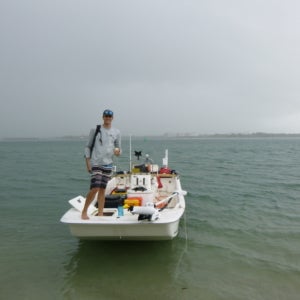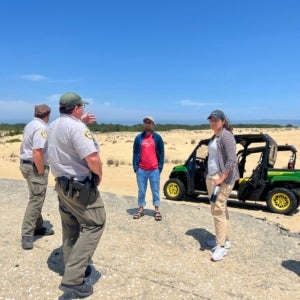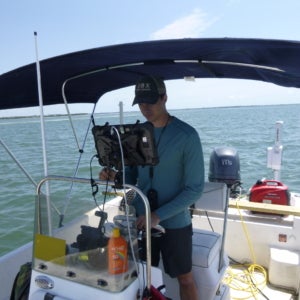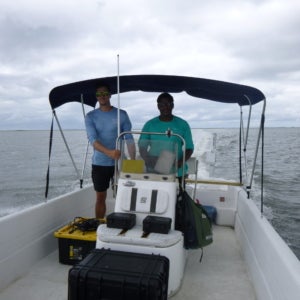Interdisciplinary Applied Data Analytics Graduate Certificate Program
The Interdisciplinary Applied Data Analytics (IADA) certificate trains graduate students in quantitative skills needed to analyze and evaluate drivers of changes in coastal and environmental health, as well as allied disciplines, based on observational data and models. We aim to empower students to translate and understand big data, interpreting actionable results and solutions to address societal challenges.
This certificate is designed to be interdisciplinary and, thus, flexible in its requirements since different skill sets may be needed depending on a student’s field. The certificate is intended to complement the curriculum of existing Master’s and Ph.D. programs at ECU and other universities, providing students with a pathway to build their quantitative skills to increase their marketability for careers in data science fields inside and outside of academia. While the majority of coursework associated with this certificate is offered in person, several online course options are also available.
Advance your education and pursue your passions
Our student learning objectives include instructing students in:
- How to develop research plans to address a key question in their field that can be solved with data science tools
- Application of multiple data analytic techniques to datasets commonly used in a student’s field of study and learning how to problem-solve common errors that may occur when applying such techniques
- How to visualize datasets and communicate research findings to diverse stakeholders and scientific peers
Certificate Requirements
Completion of this certificate program requires a minimum of 11-13 credits. Course requirements are described below:
- 1 credit: BIOL 6003 Applications in Data Science
- 3 credits: Computer Science Coursework
- 3 credits: Applied Statistics Coursework
- 3 credits: Domain Knowledge Coursework
Domain knowledge coursework refers to a quantitative class related to a student’s primary discipline. At a minimum 25% of the domain knowledge class needs to focus on quantitative skills developed based on the class’s syllabus.
- 1-3 credits: Capstone Project
Students should enroll in an independent study, thesis, or dissertation credits through their home degree program when working on their capstone project. The number of credits associated with capstone projects varies because different degree programs offer independent studies for different amounts of credit hours.
Capstone Project Prospectus Signer Form
IADA Capstone Project Guidelines
Capstone Project Completion Signer Form
- Optionally, up to 3 credit hours of informal training (e.g., MOOCs) can be used to demonstrate introductory skill development as part of this certificate.
The current list of classes affiliated with the IADA certificate can be seen in the Graduate Course Catalog. For relevant courses not currently included on this list, please send a syllabus for the class to the IADA Program Director. The Program Director will assess whether the course meets the criteria for certificate requirements.
Admission Criteria
All students enrolled in Master’s or Ph.D. programs are eligible to apply to IADA. Given the interdisciplinary nature of this certificate, we welcome students from all graduate-level degree programs. Our admissions process is aligned with that of the Coastal Community Environmental Data Scholars (CCEDS) NRT Program (https://water.ecu.edu/nrt/) since CCEDS Fellows are required to earn an IADA certificate as part of their fellowship.
The IADA certificate was first established in July 2023. During our first year (i.e., the 2023-2024 academic year), we will be accepting new applicants for the certificate on a rolling basis. In future years, we plan to establish a priority admissions deadline.
To apply to this program, four elements are required:
- For students already enrolled in an ECU Graduate program: Completion of the ECU Graduate School Form “Add A Certificate” found on the ECU Graduate School Forms page. We do not need the transcripts, CVs, and personal statements from NRT trainees.
- For students not presently enrolled in an ECU graduate program: An application form.
- Transcripts: Official transcripts are required.
- A two-page curriculum vitae (CV) that highlights your past and ongoing research, teaching, service, outreach activities, and previous experience with data analytics and data science.
- A 1-2 page personal statement: This personal statement should be written in at least 11-point font in Times New Roman. The personal statement should describe your career goals and address how training in applied data analytics will contribute to achieving those goals.
- For current CCEDS Trainees, complete the “Add a Certificate” form to apply to the IADA certificate.
- For international applicants, please see the ECU Graduate Program’s guidelines on providing evidence of English proficiency (https://gradschool.ecu.edu/international-students/).
Application Deadline Information
As this is the first year of the certificate program, enrollment is based on rolling submission basis.
Contact Information
Dr. Rebecca Asch
Associate Professor
Department of Biology
aschr16@ecu.edu
Grace Gavigan
Water Resources Center
Community Program Coordinator
gavigang19@ecu.edu
IADA Guidelines explained on YouTube
Read more about the Water Resources Center






